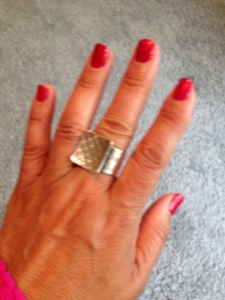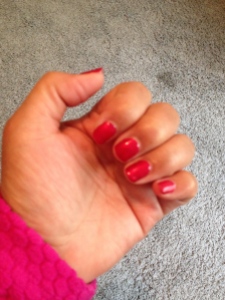I have been paying a lot of attention to my nails lately.
Twice a month, I head to the nail salon where petit women of few words trim, file, and polish my nails in bright trendy colors. They take care of my feet too, which they soak in warm water, massage and whose toenails they also polish in the same tone. My choice is usually a bright red. After grueling hours standing on concrete floor, working the cash register several times a week, both my feet and hands need care.
With increased dexterity, my manicured fingers tap the register, entering numbers and codes at the retail store where I now work. I walk from the register to the shopping cart pushed in front of me, smiling, making conversation with clients, while moving around bags of soil or concrete, plants, hardware.
My nails scratch on the hard surfaces, sometimes cracking, but they hold their integrity. They’ve come a long way from the bitten, bleeding nails of my youth, which reflected my fears and anxiety.
My polished nails are the perfect addition to the smile I offer the clients. They see a friendly clerk, eager to make their shopping experience a positive one, ready to be the best she can with what life puts in front of her. I can’t be a river, but I am the best creek I can be.
Mental illness is an invisible disability. The clients can’t see beyond the red polish of my nails or the smile outlined with bright lipstick. My interaction with them is brief; no time to notice the quickly greying hair that betrays my concealed sorrow, or the puffy bags and swollen eyelids, heavy from months of crying.
Invisible, too, is the gargantuan effort I need to make to put one foot in front of the other, to keep moving forward and looking ahead, when I feel my world crumbling around me. Yet, I show up for work on time and in good disposition. I am going to overcome depression. I will recover.
When business is slow, I grab a broom and sweep the floors. With paper towel and disinfectant, I clean the counter. Later I make sure the drinks in the refrigerator by my side all face forward, in perfect line, like teenaged girls in a school party, eager to be picked for a dance.
And when there is nothing else to arrange, and rearrange, I extend one arm in front of me, turn one hand back, and then front, curl the fingers towards me and admire my nails. They are sharp and strong. I am no longer afraid.
Le estoy prestando bastante atención a mis uñas últimamente.
Dos veces al mes voy a donde la manicurista, donde unas mujeres chiquitas y de pocas palabras cortan, liman y pintan mis uñas en vivos colores de moda. También se encargan de mis pies. Me los ponen en agua tibia, los masajean, y luego pintan las uñas del mismo tono. Mi gusto es normalmente rojo fuerte. Después de horas agotadoras parada sobre un piso de concreto, trabajando en la caja registradora varias veces a la semana, tanto mis pies como las manos necesitan cuidado.
Con creciente maestría, mis uñas pintadas golpean las teclas de la registradora, anotando números y códigos en la tienda donde ahora trabajo. Camino de la registradora hasta el carrito en frente de mi, sonriendo, conversando con los clientes, mientras muevo bolsas de tierra o de concreto, plantas, artículos de ferretería.
Rasguño las superficies duras. A veces se resquebrajan las uñas, pero mantienen su integridad. Han mejorado muchísimo desde aquellas uñas mordisqueadas y sangrantes de mi juventud, las que reflejaban mis temores y ansiedad.
Mis uñas pintadas son el perfecto acompañante para la sonrisa que ofrezco a los clientes. Ellos ven una empleada amable, deseosa de hacer que su experiencia comercial sea positiva, lista para dar lo mejor de sí con lo que la vida le pone por delante. No puedo ser un río, pero soy el mejor arroyo que puedo ser.
Las enfermedades mentales son invisibles. Los clientes no pueden ver más allá de la pintura de uña o la sonrisa delineada con una labial fuerte. Mi interacción con ellos es breve; no les da tiempo de notar mi cabellera tornándose blanca rápidamente, lo que delata mi dolor oculto, o las bolsas y los párpados hinchados después de meses llorando.
Invisible también es el esfuerzo gigantesco que necesito hacer para poner un pie en delante del otro, para mantenerme moviéndome y mirando hacia el futuro, cuando siento mi mundo derrumbándose a mi alrededor. Y sin embargo, voy al trabajo puntualmente y en buena disposición. Voy a superar la depresión. Me voy a recuperar.
Cuando hay pocos clientes, tomo una escoba y barro los pisos. Con papel secante y desinfectante, limpio el mostrador. Luego me aseguro que las bebidas en el refrigerador a mi lado estén perfectamente alineadas, con la cara de frente, como niñas adolescentes en una fiesta de la escuela deseosas de que las saquen a bailar.
Y cuando ya no hay nada más que arreglar, y reacomodar, extiendo un brazo en frente de mi, volteo mi mano de frente, y luego la palma, doblo los dedos hacia mi, y admiro mis uñas. Están afiladas, y son fuertes. Ya no tengo miedo.









Hola, mucho gusto. Que bueno encontrar alguien hispana escribiendo sobre enfermedad mental. Venga a mi “casa”, hablo sobre mi vida con bipolar II y mi vida en Spanglish con mi marido Mexicano. Soy Canadiense. Hasta luego ‘vecina’. La Sabrosona
Gracias por el reblog. Gusto en conocerla. Yo también sufro de desorden bipolar. Es muy agradable poder intercambiar experiencias con alguien en mi idioma. Mantengámonos en contacto.
Claro que si. Me gustaria platicar sobre sus experiencias y sobre todo en la comunidad hispana porque creo que hay mas estigma. Creo que hay mucha pena (la familia de mi marido no hablan mucho de esas cosas. Prefieren ignorarlas).
Que tenga un día muy bonito xx
Por supuesto. Sigamos la conversación. De eso se trata, de iniciar conversaciones inteligentes sobre el tema. Estoy de acuerdo que hay más estigma en la comunidad hispana. Nos cuesta aceptar nuestros problemas mentales y los de nuestros seres queridos.
Reblogged this on my spanglish familia and commented:
I finally found a bilingual English and Spanish blog about mental illness. Check it out.
Keep at it, Lisbeth! It’s so true about mental illness being an invisible disability.
Yes, Jennifer. There is a saying in Spanish that goes like this, ‘se ven las caras pero nunca el corazon” One can see faces, but never the heart. I would add, or the mind. You never know what goes inside.